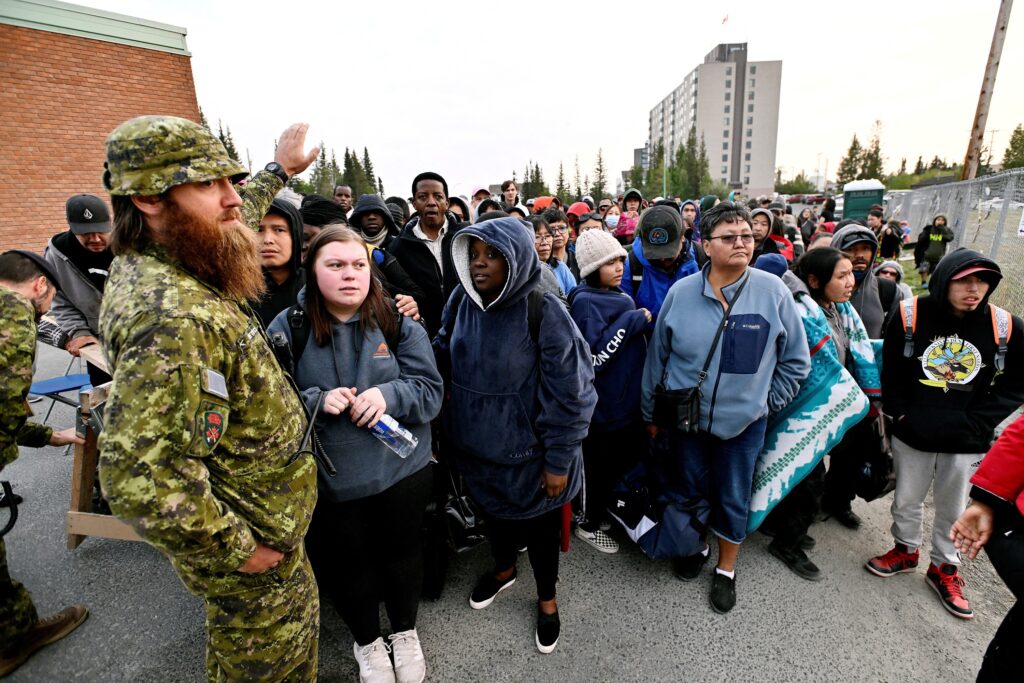Western Canada fires spark new evacuations as firefighters race flames in Yellowknife
Around 65% of the 46,000 total population of Northwest Territories looked set to be evacuated.

YELLOWKNIFE, Northwest Territories/EDMONTON (Reuters) -A massive wildfire in Canada’s western province of British Columbia prompted evacuation orders early on Friday while residents from the remote northern city of Yellowknife scrambled to get out of town before flames block their exit.
A state of emergency was declared early Friday in Kelowna, a city some 300 km (180 miles) east of Vancouver with a population of about 150,000. The Pacific province says the next 24 to 48 hours could be the most difficult.
Some of the hills around the city blazed in the predawn light after wildfires that had been burning since Tuesday jumped Lake Okanagan and spread into parts of Kelowna.
“Residents under Evacuation Alert are advised to be ready to leave their home at a moment’s notice,” the city said in a statement, adding that people should prepare to be away from their home for an extended period.
Some 885 miles (1,425 km) to the northeast, the massive blaze threatening Yellowknife, the Northwest Territories’ capital city, made little progress on Thursday, but changing winds meant it could reach the outskirts by the weekend, said Mike Westwick, the territories’ fire information officer.
“The next two days are absolutely critical and will be some of the most challenging of the season,” he told the Canadian Broadcasting Corp early on Friday.
“We’re going to be putting everything we have into slowing that progression down. We’re going to be throwing aircraft at it and when it’s safe, we’re going to be throwing people at it,” Westwick said.

The fire is about 15 km (9 miles) northwest of the city, but changing winds are expected to drive it closer. Fires have been burning on either side of the only highway out of town, but it remained open.
“Leaving Yellowknife, you’re driving into the smoke,” said Brent Saulnier, who had been visiting the city from neighboring Alberta. “It is on fire on both sides of the road. … It’s a very surreal experience.”

Many still must leave the city of around 20,000 with the deadline for evacuation set at noon local time (1800 GMT). Some 10 evacuation planes ferried about 1,500 people out of Yellowknife on Thursday, and about 22 flights were due out on Friday, authorities said.
“Nobody envisioned an event of this scale. It’s still really stressful. There are a lot of people still left in Yellowknife that are freaking out,” said resident Tebbia Teoncey, who was evacuated to Edmonton, Alberta.
Around 65% of the 46,000 total population of Northwest Territories looked set to be evacuated.
Teams including members of the military were cutting down vegetation to create fire breaks, setting up sprinkler systems, and setting deliberate fires to eliminate fuel before the bigger blaze approaches, Westwick said.
The expanse of fire risk and disruption to life and land underscores the severity of this year’s worst-on-record Canadian wildfire season, with more than 1,000 active fires burning across the country.
DRY CONDITIONS
Experts say climate change has exacerbated the wildfire problem. Drought and high temperatures have been a contributing factor to the number and intensity of this year’s fires, officials say. Much of Canada has seen abnormally dry conditions.

As the number of evacuees in Grande Prairie and St. Albert, on the northern outskirts of Edmonton, increased, both cities announced their centers reached their full capacities and redirected all arriving evacuees to a new center in Leduc south of the provincial capital of Edmonton.
Among them was the Gour family from the town of Hay River.
When they received an alert on their phones while camping out, the family was left uncertain about where their son, Liam, 13, was going to land as he was returning from a cadet trip in the neighboring territory of Yukon.
As the family made their way toward Alberta, what mattered most to Paula Gour was her family.
“The only thing that I had in mind was that I had the kids, the dogs, and we had each other and just to get out of there. That’s all you can really think about at that time,” she said.
(Additional reporting by Dan Whitcomb and Timon Johnson; Reporting by David Ljunggren, Ismail Shakil in Ottawa; Writing by Denny Thomas, David Ljunggren and Steve Scherer; Editing by Sharon Singleton, Chizu Nomiyama and Jonathan Oatis)